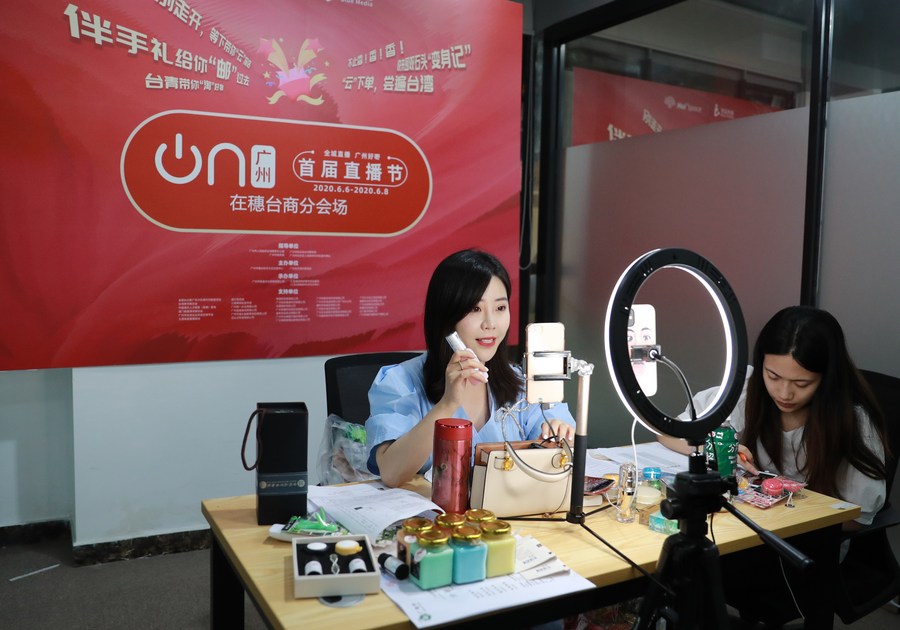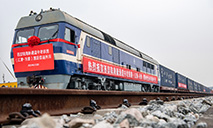Flexible employment gains increasing popularity among younger generation in China
As a result of the rapid development of new business models and changes in job seekers’ ideas about employment in China, many young people are choosing to engage in flexible employment over traditional roles, with some 200 million Chinese now flexibly employed across the country, said Xiang Dong, Deputy Director of State Council Research Office at a press conference about the government work report on March 5.
“New technologies create new spaces for employment,” said Bai Gengsheng, Member of the Standing Committee of the National Committee of the Chinese People's Political Consultative Conference (CPPCC), adding that high-level technologies such as the Internet, artificial intelligence and big data have created more job opportunities.

A network anchor presents the goods to be sold during a live video stream in Baiyun District of Guangzhou City, south China's Guangdong Province, June 6, 2020. (Xinhua/Lu Ye)
A growing number of young graduates are engaged in new occupations, such as vloggers, Internet-based content writers and podcast hosts. “In this new era, young people are provided with opportunities to pursue their own way of life,” said Gao Yan, an associate professor at the Zhuhai campus of Beijing Normal University in Zhuhai city, south China's Guangdong Province, calling the trend a departure from the choice of occupations typical of older generations.
Wang Xinge, an enthusiast of handiwork, for instance, became a vlogger and now uploads videos on China's popular video-sharing platform Bilibili. Inspired by other handiwork vloggers, the young man started to learn how to make and edit videos when he was a college student in 2017, and then became a full-time vlogger in Shanghai after graduation. “My passion for handiwork gives me the courage to pursue my dreams,” he said.
His video about the making of a replica of a gold mask unearthed from a sacrificial pit at the Sanxingdui Ruins site in southwest China's Sichuan Province with a gold bar became an instant hit online in April 2021. Later in August, he continued to make a replica of a gold stick, another cultural relic unearthed at Sanxingdui.
He admitted that financial problems were his biggest challenge in the early stage of his vlogger career. “I could hardly pay for the rent due to unstable income back then, but I never gave up because of my enthusiasm as well as confidence in the prospects for We-media,” he said.
While these youngsters pursue their dreams in new fields, they also contribute to the country’s cultural development. Hunyuan, an artist of the suona horn, a traditional Chinese musical instrument, also works as a full-time vlogger. “This occupation enables more people to understand the suona, as well as China’s traditional culture, and helps me earn some income,” said the young man born after 2000.
Some net users said that his videos help traditional Chinese musical instrument to reach a wider audience. And he believes this new occupation has infinite possibilities. “I just want to seize the moment,” he said, “who knows when the next new trend will emerge,” he added.
Another notable field is China’s Internet-based content and online literature. Readers and authors of online literature in China now exceed 460 million and 21.3 million, respectively, with many of them born after 1995 and 2000, according to a recent report.
Born after 1995, Tianruishuofu, a two-time winner of the Galaxy Award, China's most prestigious science fiction award, said after reading some works of online literature, he realized that the subject matter of fiction could be quite immense and diverse.
Bai Gengsheng, who is also vice-chairman of the China Writers Association, said that authors of online literature have injected fresh vitality into China’s literary field. Bai added that many people held the view that online literature was inferior to traditional literature, but now the two kinds of literature interact with each other in a very good way. “Online literature is the most dynamic form of literature in today’s China,” Bai remarked.
“I guess today’s online literature is like oral literature in ancient times. Everybody participates in, appreciates and spreads it,” he said. “We live in an era of literature for all.”
In addition, China is also stepping up support for the development of flexible employment. Yan Jingming, member of the 13th National Committee of the CPPCC and vice-chairman of the China Writers Association, submitted a proposal on guiding and establishing training sessions for online literature authors at this year’s “Two Sessions.” “I suggested giving online literature more chances with regard to mainstream literature awards, holding more seminars on outstanding online literature works and improving the rating system to better facilitate the development of online literature,” said Yan.
Photos
Related Stories
Copyright © 2022 People's Daily Online. All Rights Reserved.










